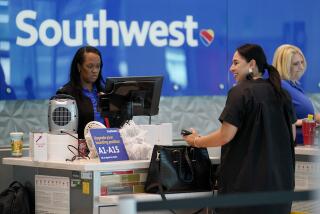Air Fare Search Sites Are Worth a Look
- Share via
As anyone who uses a mouse and modem to hunt for bargain air fares knows, trying to be your own online travel agent is a complicated, often-confounding proposition.
It’s also a time-consuming one. According to a new survey by industry consultants Gomez, more than 60% of online vacationers surf at least two travel booking sites before buying a ticket, while nearly 45% check out four or more options before buying.
Now, two recently launched travel sites promise to streamline the process.
Both Qixo.com (https://www.qixo.com) and FareChase.com (https://www.farechase.com--which requires a browser that reads Java) use proprietary search engine technology to comb the databases of multiple booking sites, looking for published airline fares and for Web-only deals and special rates negotiated between airlines and online agencies such as Lowestfare.com (https://www.lowestfare.com), OneTravel.com (https://www.onetravel.com) and Cheap Tickets (https://www.cheaptickets.com).
In theory, at least, cost-conscious travelers will be able to punch in departure and arrival cities and dates, see the best real-time deals (and their restrictions) at a glance, and click through to the winning site for booking.
FareChase.com also ranks online prices for some hotels and car rentals. Qixo.com plans to launch its own lodging and car rental comparisons Nov. 1. But an early look at the two newcomers, along with a test of an existing air fare comparison service dubbed Intellitrip (https://www.intellitrip.com), revealed as many bugs as promises.
Qixo.com scours about a dozen sites, including such online agencies as Expedia.com, Travelocity and Cheap Tickets as well as America West, National, Southwest and United airlines. It hopes to add more than 40 more sites during the next few weeks. Eventually travelers will be able to book through Qixo.com’s own site for a service fee of 1% of the ticket price or $10, whichever is lower.
By contrast, competitor FareChase.com is designed primarily as a demonstration for potential licensees, which it hopes will include major portals and content-driven sites. Like Qixo.com, FareChase.com searches about a dozen supplier and agency sites, but it has no plans to offer direct ticketing.
A third site, Intellitrip, compares published and Web-only fares for 15 domestic and international airlines, ranging from ANA to United. Intellitrip users must register before using the service, which allows would-be buyers to access (and book through) airline sites with a single password.
To compare the sites, I requested fares from Los Angeles to Chicago, leaving about 3 p.m. on Friday, returning at 6 p.m. Oct. 23.
Slickest of the three was FareChase.com, which quickly ranked and spit out 45 results ranging from $214 to $446.50, a process it said saved me one hour and 57 minutes of searching. FareChase.com’s first pick: An America West flight leaving L.A. at 10 a.m., returning at 4 p.m. Cost: $214 through OneTravel.com, or $225.95 through Cheap Tickets. Glancing down the first page of results, I found another America West combination that more closely matched my requested times. Cost: $217 through LowestFare.com.
Qixo.com, which returned more than 50 results in a similar time window, also led off with a $214 fare on America West through OneTravel.com. But I had to scroll past almost two dozen possibilities before I found one that approximated my requested schedule: A $229 fare on United, available through Travelscape.com. As for Intellitrip, I gave up after more than 10 minutes, when the only result returned was a $229 fare on United--with no flight details provided.
Clearly, such sites have the potential to ease the often-chaotic quest for a bargain fare. But they face opposition from well-established players like Expedia.com, which compete on customer service and package deals as well as airline fares and may try to block the comparison sites from searching their systems.
What’s more, extracting information from travel Web sites is difficult because both fares and the methods of calculating them vary so widely, notes John Levine, a computer expert who offers a Web-based primer to online travel (https://www.iecc.com/airline).
For computer-savvy consumers determined to get the best price, the comparison sites are worth a look. But, at least in the early stages, they’re also an advertisement for the services of a good off-line travel agent.
(For other tips on finding Internet air deals, see On a Budget, L15).
Electronic Explorer appears once a month. Laura Bly welcomes comments and questions; her e-mail address is LSBly@aol.com.
More to Read
Sign up for The Wild
We’ll help you find the best places to hike, bike and run, as well as the perfect silent spots for meditation and yoga.
You may occasionally receive promotional content from the Los Angeles Times.






